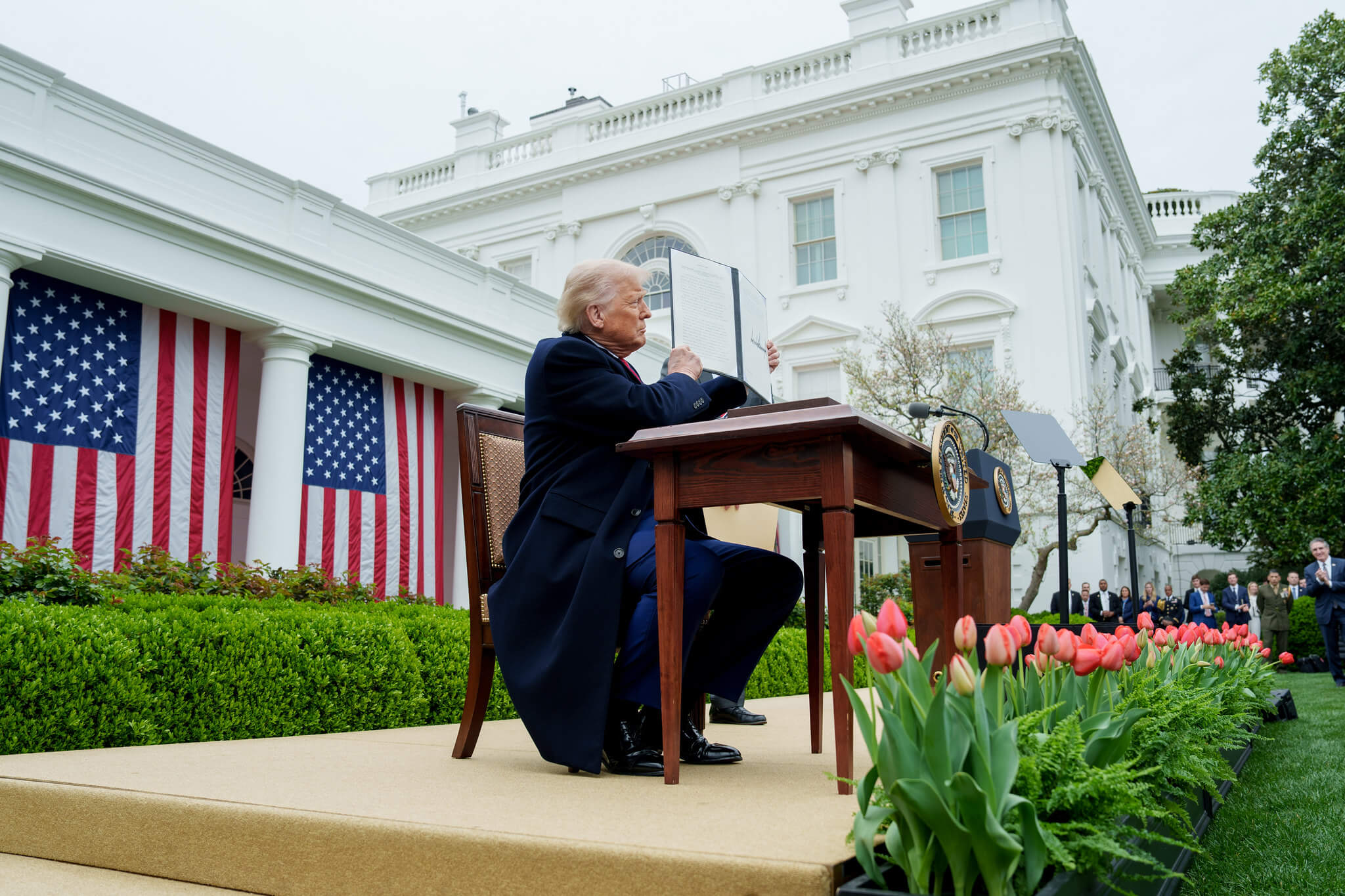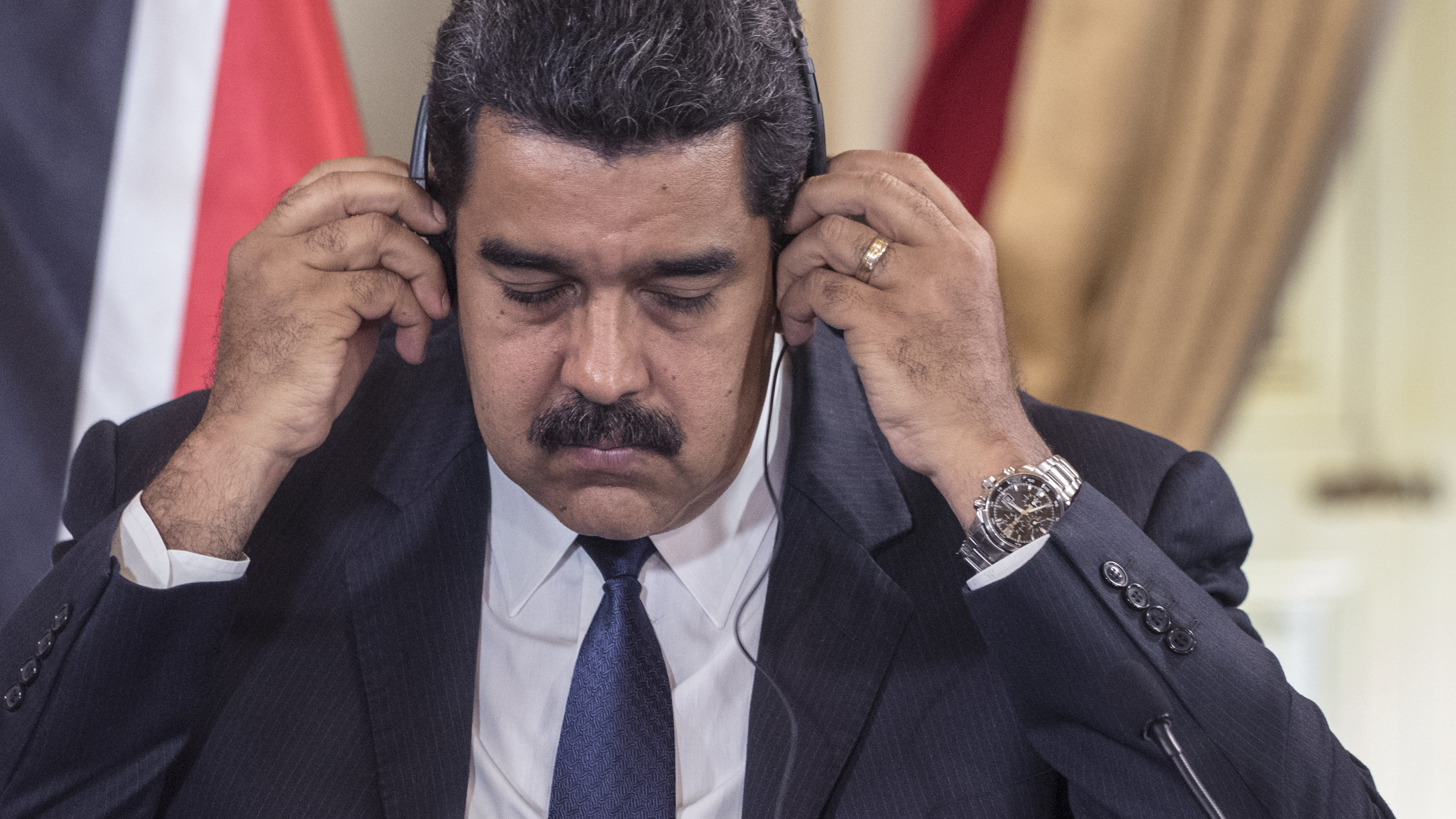Trump’s 'Emergencies' Are Pretexts for Undermining the Constitution
The president’s abusive invocations of emergency powers threaten American liberty and the constitutional system.

The Trump administration has exhibited a dangerous pattern of invoking spurious emergencies to undermine the Constitution, threatening liberty and circumventing Congress. This is most evident in the fields of immigration and trade policy. If not stopped, or at least curtailed, these policies could harm millions of people, imperil civil liberties, and compromise our constitutional system. Abuse of emergency powers is far from unique to the current administration. But Trump has taken this tendency to new heights.
“Invasion” and the Alien Enemies Act
On immigration, Trump asserts vast emergency powers by claiming that illegal migration and drug smuggling amount to an “invasion,” issuing an executive order to that effect. He further claims that this authorizes him to invoke the Alien Enemies Act (AEA)—a 1798 law that can be used only in the event of war, “invasion,” or a “predatory incursion” by a foreign government. Trump’s invocation of the AEA is—so far—limited to alleged members of the Venezuelan drug gang Tren de Aragua (TdA). But similar reasoning could be used to target migrants from almost any country that is a source of illegal migration or drugs.
Moreover, most of the Venezuelans detained and deported by Trump under the AEA have no criminal records, and there is no real evidence they are members of TdA. The administration has pointed to trivialities such as tattoos as evidence of TdA membership—even though experts have said that the gang does not use tattoos to identify members.
Trump has also declared an “emergency” at the southern border, despite the fact that illegal entries have been low since his term started. The “emergency” and the “invasion” executive orders have been invoked to shut down most legal migration across the southern border, inflicting grave harm on immigrants fleeing oppression (many thousands of whom will be denied the opportunity to seek asylum).
These measures set the stage for the administration’s dangerous—and illegal—uses of the AEA. Trump’s “invasion” theory goes against extensive evidence that, under the Constitution and the AEA itself, “invasion” means an “operation of war” (as James Madison put it), not mere illegal border crossing or drug smuggling. Before Trump, the AEA had been used only three times, all during major wars against foreign powers: the War of 1812, World War I, and World War II. As several courts have now ruled, a “predatory incursion” (which is an alternative ground for invoking the AEA) is also a type of military attack. If illegal migration and drug smuggling qualify as “invasion,” then the U.S. must necessarily be in a state of “invasion” at all times, since these phenomena are ubiquitous. Trump could thereby usurp Congress’s power to regulate immigration and declare war. Indeed, “border czar” Tom Homan claims the “emergency” at the border will continue until illegal migration and fentanyl smuggling are reduced to zero. If so, then an “emergency” (and presumably also an “invasion”) will be a permanent state of affairs.
These actions imperil the civil liberties of U.S. citizens in addition to immigrants. In the event of “invasion,” the Constitution allows the government to suspend the writ of habeas corpus, and thereby detain people—including U.S. citizens—without due process. White House Deputy Chief of Staff Stephen Miller has said that the White House is “actively looking” at suspending the writ in order to facilitate mass deportation.
Trump has used the AEA as justification for deporting people to imprisonment in El Salvador without due process (and, in many cases, in error)—and then claiming that they cannot be returned on the grounds that they are in the custody of a foreign power. This is a blatant violation of the Fifth Amendment, which requires “due process of law” before anyone can be deprived of “liberty.” This tactic, too, could be deployed against U.S. citizens, who might similarly be deported and imprisoned without any recourse. Trump has said as much, stating he would like to imprison American citizens in El Salvador.
The AEA invocation also threatens other civil liberties. The Justice Department, for example, claims that the act authorizes law enforcement to search homes without a warrant (including those of U.S. citizens) and without any judicial review. It is impossible to predict where—if at all—the administration might draw the line in challenging long-standing rights using the invocation.
Invoking the International Emergency Economic Powers Act
With his “Liberation Day” executive order, Trump has imposed massive tariffs on goods from almost every nation in the world, triggering the biggest trade war since the Great Depression. This order relied on the 1977 International Emergency Economic Powers Act (IEEPA), which can be invoked only in the event of an “emergency” arising from an “unusual and extraordinary” threat from abroad. Trump’s invocation of emergency powers to impose the “Liberation Day” tariffs suggests that the president can impose a tariff of any amount, on goods from any country, for any reason. If long-standing (and generally harmless) trade deficits that supposedly justify these measures qualify as an “emergency” and an “extraordinary and unusual threat,” the same can be said of virtually anything. Indeed, Trump now threatens to use IEEPA to impose 100 percent tariffs on foreign-produced movies, based on the dubious claim that they pose “a National Security threat.”
In fact, IEEPA does not mention tariffs at all. If vague terms like “regulate” can be used to authorize imposition of taxes and tariffs (as Trump contends with IEEPA), the president would have a free hand to tax and tariff at will.
The Constitution gives Congress, not the president, the power to “lay and collect Taxes, Duties, Imposts and Excises.” Trump’s tariffs usurp that power, giving the president free rein to inflict economic damage, grant preferential waivers to his supporters, and punish opponents. Studies show that firms contributing to Republicans were disproportionately likely to receive exemptions from the (comparatively tame) tariffs imposed in Trump’s first term. The massive “Liberation Day” tariffs would enable such favoritism on a much larger scale.
Trump is far from the first president to abuse emergency powers. President Biden, for example, used the coronavirus emergency as a pretext to raid the Treasury to forgive some $400 billion in student loan debt (the Supreme Court rightly ruled against him). More generally, the National Emergencies Act of 1976, at least as currently interpreted, has made it too easy for presidents to declare an “emergency” in a wide range of circumstances that do not merit it.
But Trump’s abusive emergency power claims are distinctive in the enormity of their scope. Using claims of “invasion” to shut down most legal migration across the southern border and engage in deportation and imprisonment without due process is unprecedented. Shutting down asylum condemns hundreds of thousands of migrants to poverty and oppression. If allowed to continue, deportation without due process could similarly be used against others, including legal immigrants and even U.S. citizens.
Using a fabricated “emergency” as a pretext to start the biggest trade war since the Great Depression is also an unprecedented abuse of the system of emergency powers, one that will impose some $1.4 to 2.2 trillion in tax increases on Americans over the next decade. By comparison, Biden’s $400 billion student loan forgiveness power grab seems relatively modest.
Judicial and Legislative Safeguards
Trump may hope that his invocation of emergency powers will insulate his abuses from judicial review. But courts have begun to reject such claims. The Supreme Court has held that the president cannot deport migrants without due process and that it must “facilitate” the return of those deported illegally. It has also rejected the idea that executive invocation of the AEA is not subject to judicial review. Multiple lower court judges have ruled that Trump’s use of the AEA is illegal, because no actual “invasion” or “predatory incursion” has occurred—including an important decision by Trump-appointed District Court Judge Fernando Rodriguez (only one judge has ruled in the other direction, holding that TdA’s activities qualify as a “predatory incursion”). These rulings also conclude that invocation of the AEA is not a “political question” exempt from judicial review.
Several lawsuits challenging the IEEPA tariffs have also been filed, including one by 12 state governments and another brought by the Liberty Justice Center and myself on behalf of five small businesses.
But whether courts and other institutions can effectively combat specious invocations of emergency powers remains to be seen. The Trump administration has already come close to defying court orders. It is difficult to say whether they will go further down this dangerous path—and what the consequences will be if they do.
In the long run, constraining dangerous emergency powers requires both judicial and legislative vigilance. Courts would do well to enforce the ordinary language definition of “emergency” as a sudden unexpected crisis, not just any possible public policy problem. As a House of Representatives report leading to the enactment of IEEPA explained, “emergencies are by their nature rare and brief, and are not to be equated with normal ongoing problems.” The same goes for the IEEPA requirement that the statute can be used only in the event of an “unusual and extraordinary threat.” That, too, should be interpreted as requiring a sudden, unusual crisis—not an ongoing, normal state of affairs. Courts also should reject broad definitions of “invasion” that would enable the executive to use expansive emergency war powers in the absence of any actual military conflict.
Congress should adopt legislation limiting presidentially declared emergencies to 30 days, unless it affirmatively votes to extend such emergencies. This would represent a marked improvement on the current system, under which Congress can terminate a presidentially declared emergency only by passing a new law—a near-impossible feat, given the two-thirds supermajority required to override a nearly inevitable White House veto.
The president may need some discretionary authority to quickly address a sudden crisis, or a genuine war or invasion. But such emergency powers cannot be allowed to become a permanent, normal state of affairs. At the very least, there should be a strong presumption against extending them, one that can be overcome only through new legislation. Judicial review of assertions of emergency powers should be nondeferential, cognizant of the grave danger posed by abuses of such extraordinary authority.
Supreme Court Justice Robert Jackson warned that the framers of the Constitution “knew what emergencies were, knew the pressures they engender for authoritative action, and … how they afford a ready pretext for usurpation[.]” Trump is asserting pretextual emergencies to undermine the Constitution. Both courts and Congress must work to combat such abuses—and to ensure that they do not recur in the future.


-2.jpg?sfvrsn=f979c73d_6)

